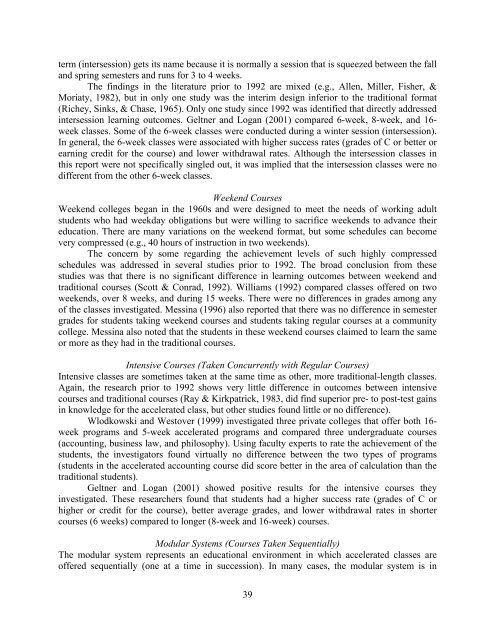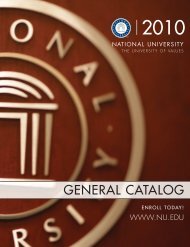Journal of Research in Innovative Teaching - National University
Journal of Research in Innovative Teaching - National University
Journal of Research in Innovative Teaching - National University
You also want an ePaper? Increase the reach of your titles
YUMPU automatically turns print PDFs into web optimized ePapers that Google loves.
term (<strong>in</strong>tersession) gets its name because it is normally a session that is squeezed between the fall<br />
and spr<strong>in</strong>g semesters and runs for 3 to 4 weeks.<br />
The f<strong>in</strong>d<strong>in</strong>gs <strong>in</strong> the literature prior to 1992 are mixed (e.g., Allen, Miller, Fisher, &<br />
Moriaty, 1982), but <strong>in</strong> only one study was the <strong>in</strong>terim design <strong>in</strong>ferior to the traditional format<br />
(Richey, S<strong>in</strong>ks, & Chase, 1965). Only one study s<strong>in</strong>ce 1992 was identified that directly addressed<br />
<strong>in</strong>tersession learn<strong>in</strong>g outcomes. Geltner and Logan (2001) compared 6-week, 8-week, and 16-<br />
week classes. Some <strong>of</strong> the 6-week classes were conducted dur<strong>in</strong>g a w<strong>in</strong>ter session (<strong>in</strong>tersession).<br />
In general, the 6-week classes were associated with higher success rates (grades <strong>of</strong> C or better or<br />
earn<strong>in</strong>g credit for the course) and lower withdrawal rates. Although the <strong>in</strong>tersession classes <strong>in</strong><br />
this report were not specifically s<strong>in</strong>gled out, it was implied that the <strong>in</strong>tersession classes were no<br />
different from the other 6-week classes.<br />
Weekend Courses<br />
Weekend colleges began <strong>in</strong> the 1960s and were designed to meet the needs <strong>of</strong> work<strong>in</strong>g adult<br />
students who had weekday obligations but were will<strong>in</strong>g to sacrifice weekends to advance their<br />
education. There are many variations on the weekend format, but some schedules can become<br />
very compressed (e.g., 40 hours <strong>of</strong> <strong>in</strong>struction <strong>in</strong> two weekends).<br />
The concern by some regard<strong>in</strong>g the achievement levels <strong>of</strong> such highly compressed<br />
schedules was addressed <strong>in</strong> several studies prior to 1992. The broad conclusion from these<br />
studies was that there is no significant difference <strong>in</strong> learn<strong>in</strong>g outcomes between weekend and<br />
traditional courses (Scott & Conrad, 1992). Williams (1992) compared classes <strong>of</strong>fered on two<br />
weekends, over 8 weeks, and dur<strong>in</strong>g 15 weeks. There were no differences <strong>in</strong> grades among any<br />
<strong>of</strong> the classes <strong>in</strong>vestigated. Mess<strong>in</strong>a (1996) also reported that there was no difference <strong>in</strong> semester<br />
grades for students tak<strong>in</strong>g weekend courses and students tak<strong>in</strong>g regular courses at a community<br />
college. Mess<strong>in</strong>a also noted that the students <strong>in</strong> these weekend courses claimed to learn the same<br />
or more as they had <strong>in</strong> the traditional courses.<br />
Intensive Courses (Taken Concurrently with Regular Courses)<br />
Intensive classes are sometimes taken at the same time as other, more traditional-length classes.<br />
Aga<strong>in</strong>, the research prior to 1992 shows very little difference <strong>in</strong> outcomes between <strong>in</strong>tensive<br />
courses and traditional courses (Ray & Kirkpatrick, 1983, did f<strong>in</strong>d superior pre- to post-test ga<strong>in</strong>s<br />
<strong>in</strong> knowledge for the accelerated class, but other studies found little or no difference).<br />
Wlodkowski and Westover (1999) <strong>in</strong>vestigated three private colleges that <strong>of</strong>fer both 16-<br />
week programs and 5-week accelerated programs and compared three undergraduate courses<br />
(account<strong>in</strong>g, bus<strong>in</strong>ess law, and philosophy). Us<strong>in</strong>g faculty experts to rate the achievement <strong>of</strong> the<br />
students, the <strong>in</strong>vestigators found virtually no difference between the two types <strong>of</strong> programs<br />
(students <strong>in</strong> the accelerated account<strong>in</strong>g course did score better <strong>in</strong> the area <strong>of</strong> calculation than the<br />
traditional students).<br />
Geltner and Logan (2001) showed positive results for the <strong>in</strong>tensive courses they<br />
<strong>in</strong>vestigated. These researchers found that students had a higher success rate (grades <strong>of</strong> C or<br />
higher or credit for the course), better average grades, and lower withdrawal rates <strong>in</strong> shorter<br />
courses (6 weeks) compared to longer (8-week and 16-week) courses.<br />
Modular Systems (Courses Taken Sequentially)<br />
The modular system represents an educational environment <strong>in</strong> which accelerated classes are<br />
<strong>of</strong>fered sequentially (one at a time <strong>in</strong> succession). In many cases, the modular system is <strong>in</strong><br />
39

















